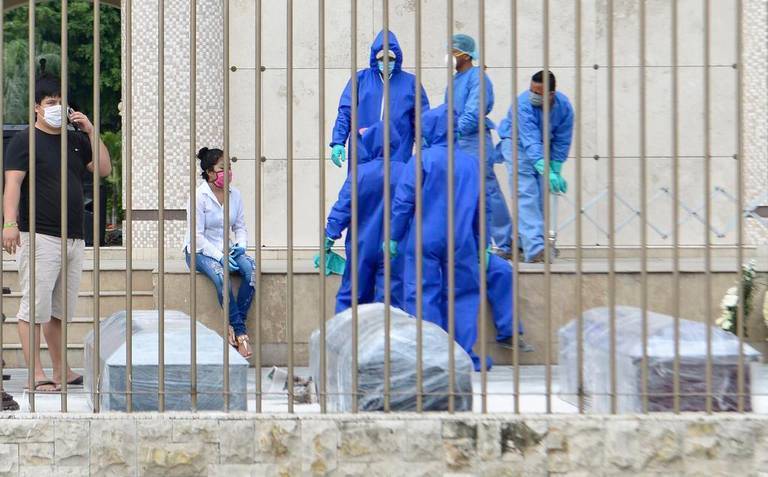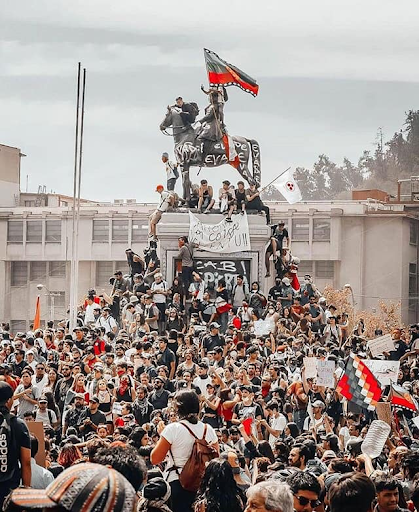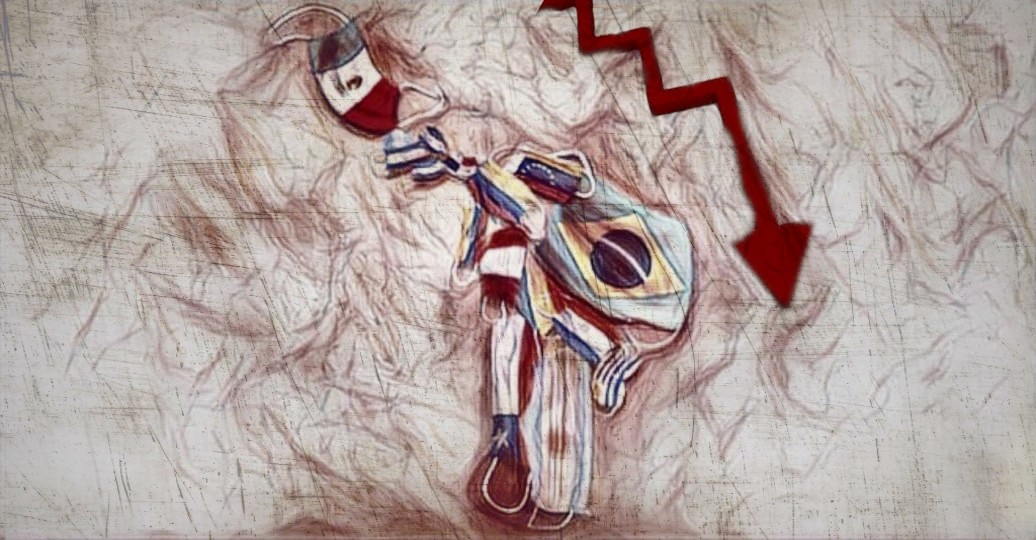The COVID-19 pandemic has created one disaster after another in Latin America, exposing the naked contempt of the ruling class for the workers of the region. But with the memory of Red October still fresh, this explosive new development is preparing revolutionary upheaval in the near future.
Read the original in Spanish here |
The coronavirus pandemic is the catalyst that just pushed the economy into a global recession. The capitalist crisis that has shaken the foundations of the world since 2008 is on its way to becoming the most acute, in historical terms.
Before the onset of the pandemic, the world economy was so fragile that any accident could have pushed it toward the precipice. The coronavirus gave it that final push.
The virus of overproduction, with financial speculation as its inevitable consequence, has infected the cells of the capitalist mode of production. Once again, private property and its legal consequences obstruct the means of production for all of humanity. Already the International Labour Organisation has warned of the loss of 25 million jobs over the next few days.
“It is clear that we have entered a recession that will be worse than that of 2009 after the world financial crisis,” said the head of the IMF, Kristalina Georgieva. The General Director of the World Organisation of Commerce said: “The most recent projections predict a recession accompanied by a loss of jobs worse than that produced by the financial crisis 12 years ago.” The capitalist system is headed for disaster. Economists from one of the largest banks in the world, Goldman Sachs, produced a report stating that Latin America is headed for its deepest recession since the Second World War.
The economies of our region have already suffered serious blows from 2008 onwards. They are now facing an economic decline, which capitalists and their political representatives have already begun to transfer onto the backs of the working class.
The logic and limits of capitalism are constantly being revealed even more clearly to the masses. As capitalists attempt to make working people and the poor pay for the pandemic, the existing crises of capitalism, and now this new crisis, they set the quickly increasing pace of the class struggle in Latin America.
The logic and limits of capitalism
In Brazil and Chile, two countries governed by the worst representatives of the bourgeoisie, the naked contempt of the ruling class for workers is plain to see. They use us as cannon fodder to maintain their profits and privileges.
In Brazil, the infernal duo of Bolsonaro and Guedes are making all of the bosses’ wishes come true. They are campaigning against the coronavirus quarantine, pushing for workers to stop receiving their wages, and imposing anti worker legislation with respect to health, holiday time, and working from home. The provisional measure they have introduced to achieve these goals is nothing short of murderous.
With 4,661 infected people and 165 dead, Brazil is 18th among the countries most affected by the pandemic. At the same time, rage against this government of bosses and generals is on the rise. Cacerolazos (pot banging protests) resound throughout the nation, and the unrest has forced Bolsonaro to retract some of his measures.
 In Brazil and Chile, whose ruling classes are especially degenerate, the naked contempt of the ruling class for workers is plain to see / Image: Isac Nóbrega
In Brazil and Chile, whose ruling classes are especially degenerate, the naked contempt of the ruling class for workers is plain to see / Image: Isac Nóbrega
According to a forecast by the Getulio Vargas Foundation, the Brazilian economy may contract by 4.4 percent in 2020. The only positive solution to the public health and economic crisis is the end of this regime.
In Chile, the piranha of La Moneda (Chile’s presidential palace), Sebastián Piñera, is using the pandemic to try to sweep away the insurrection that began in October. The regime is maneuvering to put itself back together and drown the movement.
Declaring a “state of catastrophe,” the cruel, roundly hated right wing seeks to demobilise workers and youth as the government militarises the streets again, and takes advantage of protestors’ absence to advance on Santiago’s Dignity Plaza (a location of great psychological and symbolic importance to the protest movement). They have also postponed the plebiscite for constitutional reform (originally scheduled for April) until October.
The mood of the working class is one of anger and discontent. They see clearly that Piñera, a systematic violator of human rights, shamelessly manipulates the current situation, while none of the problems that led to the insurrection have been resolved. The government and the overall regime are discredited despite having, in one way or another, the collaboration of all parties. The ineptitude of the government is being criticised from all sides.
In Chile, 2,500 coronavirus cases and eight deaths have been reported, exacerbated by a healthcare system devastated by decades of an economic regime that has made Chile one of the most unequal countries in the world. Chile has followed the “Italian” model – reactive, improvised, and gradual in the face of the pandemic – to confront this crisis. The paltry count of 1,700 respirators currently available to the healthcare system foreshadows thousands of deaths in the coming months. The measures adopted in the face of the pandemic intensify the decline in wages, make work relations more precarious, and allocate state resources to protect capitalists and their profits.
The Chilean economy was already slowing down before the coronavirus hit. Economists of the Credit Suisse Group have said that “Chile will probably be among the Latin American economies most affected by the worldwide economic decline as countries struggle against the coronavirus outbreak.”
In Chile, March began with an uptick in the insurrectional process. Barricades and looting were accompanied by a return to the highest levels of mobilisation by students and working men and women. The pandemic has slowed the process down temporarily, but Chile will explode sooner than later, without a doubt. The movement to confront the pandemic and the economic crisis must be tied to the demand to throw out the Piñera government and the capitalist regime it represents.
In El Salvador, Nayib Bukele, who caused a crisis in bourgeois democracy by militarising the parliament, has followed the recommendations of the WHO: airports and borders have been closed, and a package of economic measures has been announced. However, this is in stark contrast to the country’s hospital capacity of only 13 beds for every 10,000 inhabitants (Cuba has 52) and public healthcare spending of $583 USD per person (Cuba spends $2,486 USD). This is in a country of seven million inhabitants where two million live in poverty. This is what capitalism offers the Salvadoran people.
In spite of the popular approval Bukele currently enjoys, sooner or later his support base and his authority will result in conflict due to the explosive situation that is underway. The economic package put forward by the government to safeguard capitalist interests will lead to an increase in public debt (already the second highest in Central America), which will in turn will lead to further austerity measures.
The country registered its first case of coronavirus on 19 March, and to date 30 cases have been reported. The upcoming global recession will cause an earthquake in Central American economies. According to the analysis of Barclays investment bank, the GDP of El Salvador will fall to negative three percent. This will mean a drastic decline in the quality of life of workers, women, and youth.
We should put no trust in the bourgeois politicians, presidents, ministers, judges, and parliamentary representatives. Only the movement of the masses, with a programme based in revolutionary marxism, can fight for the costs of the crisis to be paid by the country’s 160 millionaires. This group of 160 accumulates riches equivalent to 87 percent of national production under the current regime.
In Argentina, the Fernández and Fernández government adopted an early series of measures, including mandatory social distancing, suspension of classes, and closing borders, all of which will flatten the virus’s contagion curve. This has increased the popularity of Alberto Fernández: the 48 percent of the vote with which he was elected president has soared to a 93.8 percent approval rating. 80 percent of those polled by the consulting firm Analogias approve of his administration. However, his increased popularity has come about within a context of political instability.
With 966 coronavirus cases, 24 of whom have died and 228 recovered, the state is trying to buy time to improve healthcare services from now until the peak of contagion, which they expect will hit at the end of April or May. Meanwhile, they are pouring economic resources into alleviating the suffering of the hardest-hit sectors. Cuts to public services have been prohibited, and rents have been frozen.
But capitalist logic imposes itself implacably on the government’s intentions: whomever accepts capitalism must accept its logic. The response of the business community was immediate: the prices of meat, fruit and vegetables and other essential goods have exploded. The price of beef went up 1.2 percent, chicken 3.6 percent, and vegetables 3.5 percent. Alcohol gel sanitiser is now three times more expensive than it was before.
The Industrial Union of Argentina is in conversations with the General Federation of Workers to reduce salaries, should the quarantine be prolonged. Construction company Grupo Techint announced the layoff of 1,450 operators, and layoffs have been announced at San Martín Railway, Mc Kio Kiosks, YPF Gas, Cinemark, Agroservice, and Gate Gourmet. Cancellations of holiday time as well as suspensions are on the order of the day.
 The bosses are pressing the government to lift social distancing, to sustain their profits by using workers like cannon fodder / Image: fair use
The bosses are pressing the government to lift social distancing, to sustain their profits by using workers like cannon fodder / Image: fair use
Banks and industry are pressing for the government to lift the social distancing requirements, and looking to sustain their profits by using workers like cannon fodder.
The situation in large neighbourhoods, especially those in the city of Buenos Aires, is frightening. In Argentina, 40 percent of the population is in poverty or extreme destitution that has not improved for decades. During the Cambiemos years (the party of former president Macri), it has only increased.
The government’s economic and food assistance is a step in the right direction, but it does not go far enough. To address the economic and social needs of workers, we need resources that will be adequate to the demand. This means taking on capitalism itself in the form of bourgeois private property and the privileges and profits of the big capitalists.
Banking and financial entities closed last year with gains of 314 billion pesos. The agricultural industry, concentrated in just a few hands, made $7.632 billion USD last year. The Argentine pharmaceutical industry had a turnover of $19,700,000 USD in the last few years. Tenaris, of Grupo Techint, made $494 million USD in just the first six months of 2019. The 50 main Argentine businesses hold a fortune of $58 billion USD. This is where we can find the necessary resources to handle the pandemic and the economic crisis. However, to move in that direction, we need a programme that goes beyond the limits of capitalism. We revolutionaries prioritise life over the profits of businesses, banks, and landlords.
We shall see whether the crisis will force the government to act against the interests of the masters of the national economy to avoid a revolt of the masses, or whether it will be dragged along by the contradictions imposed by capitalism.
Regardless of how far the government is prepared to go in its measures, the wheels of history will continue to turn. The capitalist crisis is of such magnitude that only overthrowing capitalism itself will provide a viable alternative to the working class. We will see the government submit to the iron logic of capitalism: you cannot control what you do not own! Under the regime of private property, it is the capitalists that set the course for the economy. For this reason, the interests of workers are antagonistic, irreconcilable, and completely opposed to those of business. The government’s logic of “national unity” under which “all Argentines must unite” to conquer the pandemic “together” is unrealistic and distracts people from the true dichotomy that keeps society divided along class lines.
The need to create a workers’ party that can include everyone in our class, breaking with a class collaborationist strategy that makes us into a caboose on the capitalist train, is more necessary now than ever. Revolutionaries must not only take on this task, but they must also simultaneously put into motion the forces of Marxism in Argentina.
What to do?
No matter who governs or which measures they apply to contain the pandemic and the economic crisis, if there is no break from capitalism, then capitalist logic will continue to dominate our society. Some governments may stretch themselves a bit beyond their normal limits while sustaining capitalist interests at the same time, while others may attack the working class directly. The same reality underlies both: capitalism is incapable of responding to our needs, and given the violent intensification of the crisis, this can only mean setbacks in our living conditions.
With this we do not mean to say, as ultraleftists do, that all governments are equal. What we say is that all governments succumb to the logic of capitalism because they have no alternative to offer.
 The Red October left in its wake many lessons. Most importantly: we need leadership that can advance towards the seizure of power / Image: fair use
The Red October left in its wake many lessons. Most importantly: we need leadership that can advance towards the seizure of power / Image: fair use
At this moment, the pandemic and the economic crisis go hand in hand. But the health crisis will pass sooner or later, and they will want the working class to pay the bill. We don’t have to.
No economist, no matter what their political beliefs, denies that we are in a new recession on a global scale. This will mean mass rebellion, and this is the future for which we must prepare ourselves. In the next epoch, we will see more insurrectionary uprisings and revolutionary outburst. We must prepare for the future!
The Latin American Red October left in its wake many lessons. One of the most important of which shows us that the absence of the subjective factor, a leadership that can advance the working class towards the seizure of power and the revolutionary overthrow of the bourgeoisie, leads directly to the capitalists regrouping, who use a thousand and one means to safeguard their interests. We cannot succeed unless we have a leadership that will direct revolutionary outbursts towards the seizure of power. We must build a revolutionary party with the authority of the masses.
We are in exceptional times that require exceptional methods. We must link the most basic demands for healthcare, employment, democratic rights, wages, and housing with more general demands: collective, socialist property, democratically controlled by the workers themselves. We can use the fundamental levers of the economy and the wealth generated by the labour of the working class to overcome capitalism. We are speaking explicitly of the need to expropriate capitalist property, without compensation.
Latin America is historically the most unequal region on the planet. Here, the national bourgeoisie has put us under the control of imperialism. This new economic crisis and the pandemic threatens to put us back into the Dark Ages: we cannot allow it. The crossroads of “socialism or barbarism” becomes more of a reality day by day in the brains, the muscles, and the nerves of the working class.
Comrades: the routine has been broken and the molecular process of revolution is moving along quickly. As Lenin said: “There are decades where nothing happens and there are weeks where decades happen.” We must move forward with a sure step in thought and action to the construction of a powerful Marxist tendency, based firmly within the working class movement, with an internationalist perspective. This can change the course of events. We have nothing to lose but our chains!
Bread, health and work!
May the wealth that workers produce belong to the workers themselves!
For the socialist federation of Latin America!

